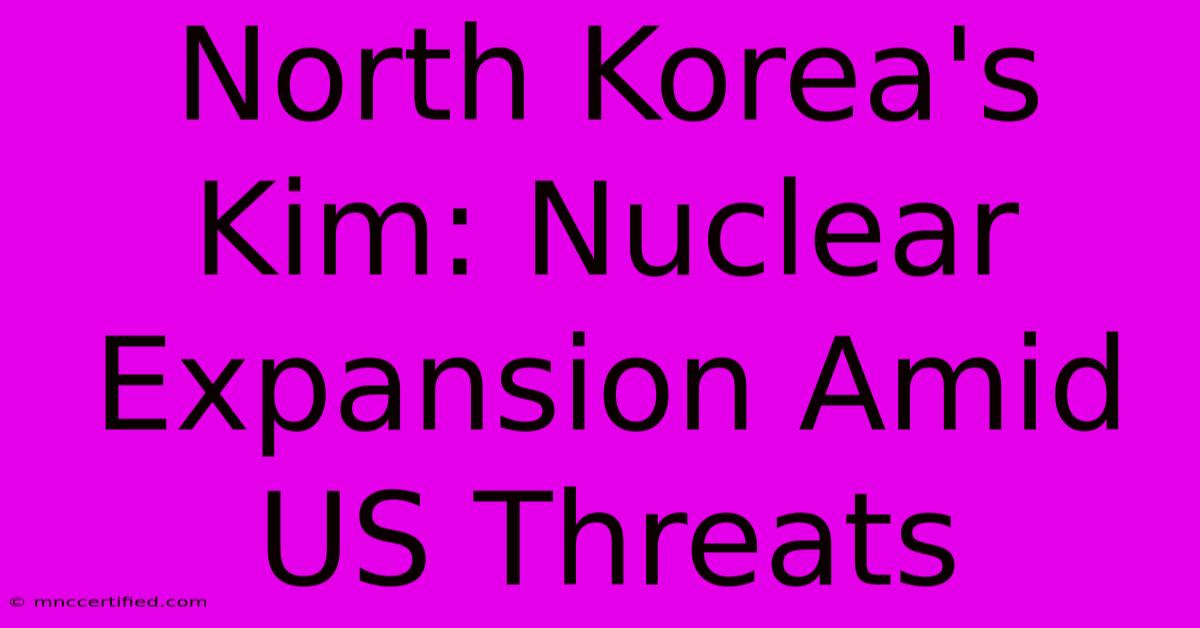North Korea's Kim: Nuclear Expansion Amid US Threats

Table of Contents
North Korea's Kim: Nuclear Expansion Amid US Threats
North Korea's pursuit of nuclear weapons continues to be a significant global concern, creating a complex geopolitical landscape marked by escalating tensions and diplomatic challenges. This article delves into the motivations behind Kim Jong-un's nuclear expansion program, the perceived threats from the US, and the potential consequences of this ongoing standoff.
Kim Jong-un's Nuclear Ambitions: A Multifaceted Strategy
Kim Jong-un's relentless pursuit of nuclear weapons isn't solely about military might; it's a multifaceted strategy aimed at achieving several key objectives:
-
Regime Survival: The primary driver is arguably the survival of the Kim regime. Nuclear weapons serve as the ultimate deterrent against potential foreign intervention, perceived as a constant threat, particularly from the US and its allies in South Korea and Japan. The possession of nuclear weapons provides a crucial security blanket against regime change.
-
Regional Hegemony: Nuclear capabilities bolster North Korea's standing within the region, allowing it to project power and influence its neighbors. This ambition challenges the established regional order and asserts North Korea's defiance of international norms.
-
International Recognition: While seemingly paradoxical, nuclear status provides a form of twisted international recognition. Despite widespread condemnation, possessing nuclear weapons forces global powers to acknowledge North Korea as a player on the world stage, demanding engagement, albeit often reluctant.
-
Economic Leverage: The nuclear program, unfortunately, provides a bargaining chip in negotiations with the international community, particularly with the US. North Korea uses the threat of further nuclear development to extract concessions, often in the form of aid or sanctions relief.
Perceived US Threats: Fueling the Nuclear Arsenal
From North Korea's perspective, the US represents a persistent and existential threat. Several factors contribute to this perception:
-
Military Presence: The significant US military presence in South Korea and Japan, alongside regular joint military exercises, is viewed by Pyongyang as a direct threat to its sovereignty and a preparation for invasion.
-
Past Interventions: The Korean War and the US's involvement in numerous regime change operations across the globe fuel North Korea's deep distrust of US intentions.
-
Sanctions: The crippling international sanctions imposed on North Korea, largely orchestrated by the US, have severely hampered its economy, exacerbating internal hardships and reinforcing the regime's belief in the need for self-reliance through nuclear deterrence.
The Dangers of Escalation: A Delicate Balance
The ongoing nuclear expansion by North Korea presents significant dangers:
-
Regional Instability: The possibility of miscalculation or accidental escalation significantly increases regional instability, posing a direct threat to South Korea, Japan, and potentially beyond.
-
Nuclear Proliferation: North Korea's nuclear advances could inspire other nations with similar ambitions, potentially leading to a wider proliferation of nuclear weapons.
-
Global Security: The possibility of a nuclear conflict, however remote, poses a grave threat to global security, with potentially devastating consequences.
Finding a Path to De-escalation: Diplomacy and Dialogue
While the situation appears bleak, de-escalation through diplomatic efforts remains crucial. This requires:
-
Open Communication Channels: Maintaining open communication channels, even in the midst of tensions, is essential for preventing misunderstandings and miscalculations.
-
Confidence-Building Measures: Implementing confidence-building measures, such as reducing military exercises or easing sanctions incrementally, could help foster trust and create a more conducive environment for negotiations.
-
Long-Term Strategic Engagement: A long-term strategy that focuses on addressing North Korea's security concerns and improving its economic situation is crucial for lasting peace. This requires patience, diplomacy, and a commitment to a peaceful resolution.
The North Korean nuclear issue remains a highly complex and volatile situation. Understanding the motivations behind Kim Jong-un's actions, the perceived US threats, and the potential consequences is crucial for navigating this perilous geopolitical landscape and working towards a peaceful resolution. The path ahead requires careful diplomacy, strategic patience, and a commitment to de-escalation to avoid a potentially catastrophic outcome.

Thank you for visiting our website wich cover about North Korea's Kim: Nuclear Expansion Amid US Threats. We hope the information provided has been useful to you. Feel free to contact us if you have any questions or need further assistance. See you next time and dont miss to bookmark.
Featured Posts
-
Trailer Rental Business Insurance
Nov 19, 2024
-
Rhode Island Motorcycle Insurance
Nov 19, 2024
-
Bentancur Sanctioned Details Revealed
Nov 19, 2024
-
Jolies Night Out Effortless Elegance
Nov 19, 2024
-
Life Insurance For Private Pilots
Nov 19, 2024